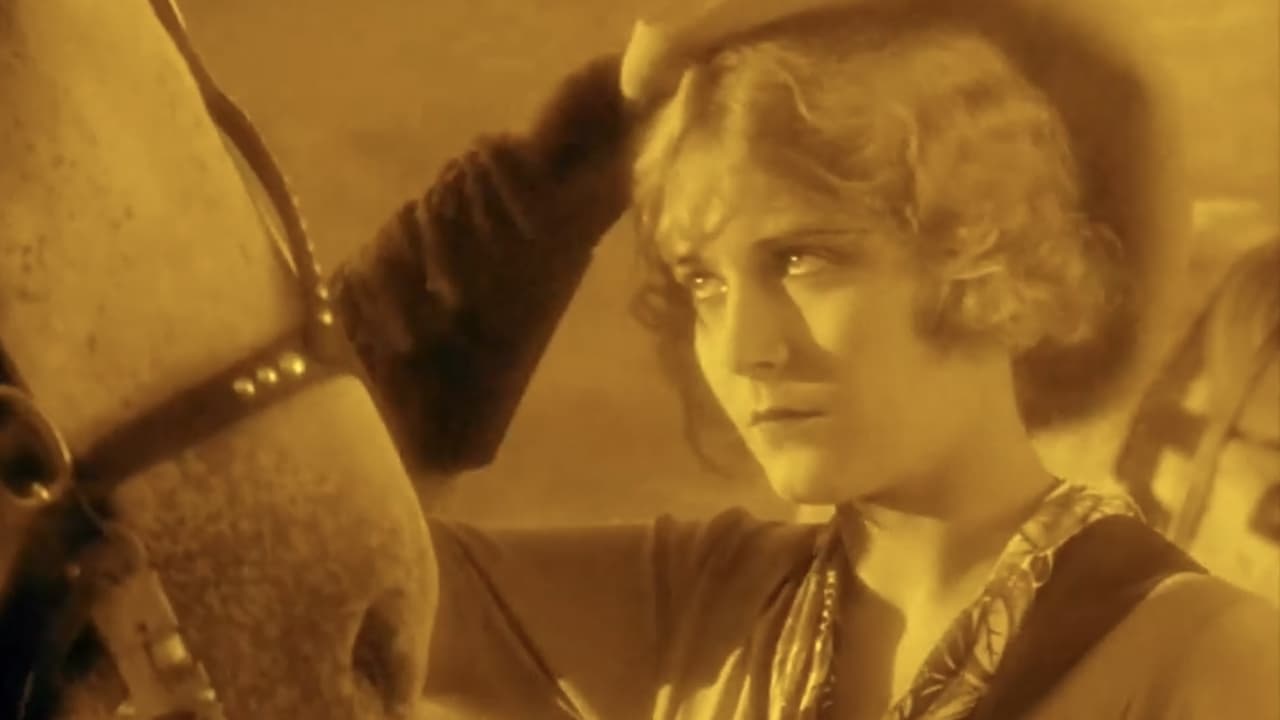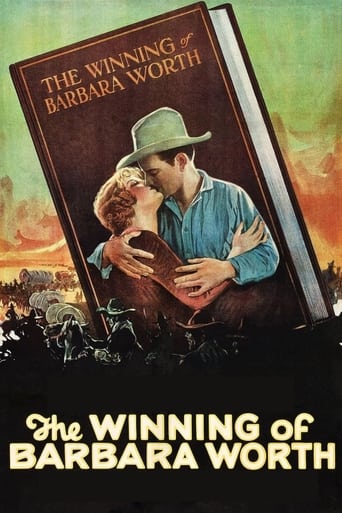


A familiar title, as it was Gary Cooper's debut, I've always thought it was some sort of drama about settlers in which a fort or township called 'Barbara Worth' (as in 'Santa Barbara') gets saved at the end.However Barbara Worth turns out to be the name of the heroine, and the plot proves more of a soap opera than an action movie, as Ronald Colman and Gary Cooper vie for her affection. Who cares? Despite their combined star power, Colman has little to do, and Cooper even less. Vilma Banky is charming in the title role, but the personal drama proves remarkably uninteresting. What makes the film live is the superb photography by George Barnes and Gregg Toland - shown off to perfection in the beautiful tinted print available - and the flood created when the Colorado bursts its banks, engineered by special effects veteran Ned Mann, (best-known for his work in Britain for Korda during the 30's), who presumably also created the Dust Devil we see at the start.
... View MoreA 1926 silent-era western. The Barbara in question is the adopted daughter of a western pioneer. His plan to irrigate his area from the Colorado river is picked up by a New York financier. One of my favorite actors, Ronald Colman is the engineer set to head up the project. He immediately becomes a love interest for Barbara. His main romantic adversary though, is Gary Cooper; a local hometown boy with unresolved feelings for the lady.Everyone, however, is faced with a bigger problem. The corporate financier is playing hardball and cutting financial ties with the settlers. While I've always loved Colman, and always hated Cooper; that becomes less relevant being that this is a silent film. Acting is not the biggest conveyor in the storytelling. The film here was remarkably well-preserved; some of it shot in Nevada locations. Not a genre I will be investigating fully, but a fun one-off nonetheless.
... View MoreWhen sound films came in Vilma Banky's career was over. She hadn't learned to speak English that well and had a very thick accent, but besides she didn't really care. She had married Rod La Roque a couple of years before and their marriage proved to be one of the happiest in Hollywood. So she was quite happy to retire. Samuel Goldwyn had discovered her on a talent hunt through Europe and bought her to Hollywood where she was frequently co-starred with Ronald Colman. She also co-starred with Rudolph Valentino in "The Eagle" and "Son of the Sheik", and then it was back to Ronald Colman for "The Winning of Barbara Worth". This was one of the great epic Westerns of the 20s, along with "The Covered Wagon" (1923) and "The Iron Horse" (1924). Neither Colman nor Banky where keen about going to Nevada for location shooting and Gary Cooper was only signed for his role a few days before filming began.Set around the turn of last century in Kingston, a south western desert town, when civilization was fast encroaching on the old west and it's ways. Automobiles were owned and trains could make traveling to the big cities easier. The story is about bringing irrigation to the dry West.The first thing I noticed was the beautiful tints and the stylized images, certainly in the opening sequences. While a woman (Vilma Banky) has just buried her husband in the unforgiving desert, Jefferson Worth has come West with the dream of bringing irrigation to make the barren land into a paradise. During a terrible dust storm (a really stunning sequence) Jefferson finds the little girl "Barba", kneeling by her dead mother.Fifteen years later Jefferson realises his dream to bring water to the parched desert and has pride in his adopted daughter Barbara Worth (Vilma Banky). Abe Lee (Gary Cooper) son of Jefferson's old friend is in love with Barbara, but after she has a riding accident, Holmes (Ronald Colman), partner of a newly arrived land developer, offers his assistance. Gary Cooper looks so gorgeously young, it is unbelievable that Barbara would choose the rather stuffy Ronald Colman.Mr. Greenfield, his partner has been hired to build a dam for the town of Kingston. The vast panorama of the desert, complete with the burnished amber tints make this film, to me, a "vision splendid". The scene where the dam is filled is wonderful. Greenfield is a charlatan and has skipped town rather than spend money re-enforcing the dam. He also sacks all of Worth's people for spreading malicious "lies" about a flood that will destroy the town. So most of the townsfolk go in search of safer ground. Jefferson founds a new town - Barba, built high on a mesa but because of Greenfield's blockade, he finds he cannot meet his payroll. Holmes, who is completely innocent of Greenfield's plans, is secretly appealing to the bankers on Worth's behalf. When the people realize they cannot be paid, they want to burn down the town. Barbara is left alone but some of the men are in Little Rosebud's gang and she is attacked. Abe has been entrusted with the payroll but on the way he is shot by one of Rosebud's gang and realises that Holmes is decent and on the level when he saves Abe's life and delivers the payroll himself.The flooding of the Colorado River is spectacularly done. As the residents of Kingston flee to the high country of Barba, there are some amazing images of people escaping the flood ravaged town. Little bedraggled children, a man sleeping on the roof, a man running out of his bath, a man trying to escape on his wheelchair and a donkey going wild and upending a load, while the relentless river engulfs the town.It is a spectacular film, worthy of a re-look. An interesting scene showed a cushion embroided with a swastika - originally a native American symbol of good will. I also thought I saw Clarence Wilson in a bit as a barber and Clyde Cooke, a silent film comedian, played Tex, a comic sidekick. On my copy Gaylord Carter provided the organ accompaniment.Highly Recommended.
... View MoreThere is no mention of the source of the music, but Gaylord Carter played his improvised score for a special showing of The Winning of Barbara Worth on January 28, 1971, and it's a recording of that performance which turned up on the DVD. The instrument was a 36-rank Wurlitzer Pipe Organ. Henry King and Frances Goldwyn were in the audience and both spoke after the film. I was there. Mr. King described his search for a desert that looked like a desert, after finding the Mojave in bloom. He also recalled hearing Gaylord Carter play the organ at the Million Dollar Theatre in Los Angeles in the 1920's, soon after Harold Lloyd recommended Gaylord for the job.
... View More